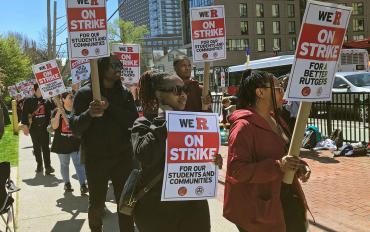The strike that began April 10 at Rutgers University is groundbreaking. For one thing, it’s the first time since its founding in 1766 that faculty at Rutgers have gone on strike. For another, demands include not only fair pay but also equity, diversity and justice in the community. And finally, this strike is one of the largest of its kind in the history of higher education, involving three unions representing 9,000 professors, part-time lecturers and graduate workers at a school serving 67,000 students.
Participating unions are the Rutgers Council of AAUP Chapters, American Association of University Professors-American Federation of Teachers; the AAUP Biomedical and Health Sciences of New Jersey; and the Part-Time Lecturer Faculty Chapter at Rutgers AAUP-AFT, though many more unions across Rutgers’ campuses and across the country are expressing solidarity.
“This is an incredible moment,” said Bryan Sacks, a professor of philosophy, the vice president of PTLFC and the chair of the bargaining committee, the night before the strike began. “We are about to embark on what is the largest public sector strike in the history of New Jersey.”
Still, it is substance, not size, that inspires the movement.
Fairness and justice
“The administration doesn’t understand that we are determined to fight together for equal pay for equal work, a living wage for all, real job security, race and gender equity, and a fair salary increase,” union leaders said in a message to members. Noting that bargaining has dragged on for nearly a year, they outlined contract negotiations that have been rocky at best: “This entire time, the administration has delayed and obstructed our efforts to reach an agreement. Our unions and the administration are still far apart on core demands, especially those affecting our most vulnerable colleagues.”
Bargaining team members report that administrators demonstrated “little respect” and proffered “insulting offers” at recent sessions. “We have bargained and bargained and bargained and bargained and bargained and we’re not getting anywhere,” says Rutgers AAUP-AFT President Rebecca Givan. “We need to do something more.”
Among union demands are a living wage for adjunct faculty; pay equity across the three campuses, which until now have set faculty pay that reflects the lower-income or higher-income communities they serve; a fair salary increase that keeps pace with inflation; guaranteed graduate worker funding for five years and one-year extensions for those whose degrees were delayed by the pandemic; job security and benefits for fractional nontenure-track faculty; and additional job security measures such as longer contracts for nontenure-track faculty.
The union is also pressing for “common good” measures such as diversifying faculty; supporting underserved, underrepresented and first-generation students; protecting faculty and students against harassment, bullying and caste-based discrimination; protecting immigrant and international workers; and launching a “Beloved Community Fund” for local residents in need.
Solidarity at home and across the country
Amy Higer, a global affairs professor and an adjunct faculty member at Rutgers since the late 1990s, says despite decades of low pay and little to no job security among adjuncts—a reflection of a university shrinking the number of well-paid jobs in academia—she is feeling hopeful. “For the first time that I’ve been teaching at Rutgers, I and my colleagues do not feel alone,” she says. “In solidarity there is power. There is power in a union, and unions are most powerful when they have organized to correct injustices.”
She continues: “We are united because Rutgers students deserve the best possible education, and this means paying their teachers a fair wage and providing them with some semblance of job stability and security to end the high turnover of faculty and the demeaning practice of having us reapply for our jobs every semester.”
The solidarity extends beyond New Jersey. “We are not alone,” says Todd Wolfson, general vice president of Rutgers AAUP-AFT. “The strikes that are happening right here in New Jersey and in other parts of the country right now are building on a historic strike wave in higher education.” To wit: AFT-affiliated faculty at Chicago State University and Eastern Illinois University are on strike; nearby Governors State University faculty began a strike April 11; and graduate workers at the University of Michigan have been on strike since March 29.
Higer sums up: “We all know that the only way to end income inequality and unjust working conditions in this country is by mobilizing our power, withholding our labor—without which Rutgers cannot run—and staying unified and united until Rutgers provides us with the contracts we deserve.”
[Virginia Myers]

